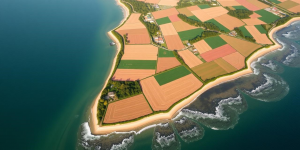Virginia’s coastline – a vibrant mix of bustling ports, historic towns, and precious natural habitats – is facing a growing crisis: rising sea levels. This isn’t some far-off worry; it’s happening now, impacting everything from property values to the livelihoods of our fishermen. Understanding the economic fallout of this environmental shift is vital for everyone who calls Virginia home. The time to act is now, to protect the future of our state.
Virginia’s Coastline Under Threat: Why Sea Level Rise Matters
So, why is Virginia so vulnerable? Several factors are at play: our low-lying coastline, the sinking of land (known as subsidence), and the increasing number of extreme weather events. The Virginia Institute of Marine Science (VIMS) has found that parts of the Chesapeake Bay are experiencing some of the highest rates of sea level rise on the East Coast. Projections show a potential rise of 0.5 to 1.5 feet by 2050 – and possibly even more depending on greenhouse gas emissions. That might not sound like much, but even a small increase can have a devastating impact.

The Ripple Effect: How Sea Level Rise Impacts Virginia’s Economy
The economic consequences of rising sea levels are widespread, hitting crucial sectors across Virginia.
Real Estate: A Slippery Slope
Coastal properties are losing value as the risk of flooding looms larger. Homeowners are grappling with skyrocketing insurance premiums, and many are struggling to sell their homes at all. This decline in property values doesn’t just hurt homeowners; it also shrinks local government tax revenues, impacting funding for essential public services.
Infrastructure: Roads, Bridges, and Rising Tides
Our roads, bridges, and other vital infrastructure are becoming increasingly vulnerable to flooding and erosion. The cost of repairing and replacing damaged infrastructure is a drain on resources, diverting funds from other essential projects. And disrupted transportation networks can cripple economic activity.
Tourism: Will Visitors Still Flock to the Coast?
Virginia’s coastal areas are magnets for tourists, who contribute significantly to our state’s economy. But rising sea levels threaten our beaches, parks, and historical sites – potentially scaring away visitors and slashing tourism revenue.
Fishing Industry: Troubled Waters Ahead
The Chesapeake Bay is a lifeline for Virginia’s fishing industry. But rising sea levels and increased salinity can devastate oyster beds, crab habitats, and other marine resources, jeopardizing the livelihoods of fishermen and seafood businesses.
Small Businesses: Fighting to Stay Afloat
Coastal businesses, from cozy restaurants to bustling retail stores, are at constant risk of flooding and storm damage. Owners face mounting costs for flood insurance, repairs, and even relocation. Tragically, some may be forced to close their doors for good, leading to job losses and economic hardship.
Hampton Roads: A Case Study in Crisis
Hampton Roads, a densely populated coastal region in southeastern Virginia, is ground zero for the impacts of sea level rise. The region is home to major military installations, shipyards, and ports – all critical to Virginia’s economy. Recurrent flooding is already a grim reality, disrupting daily life and inflicting significant economic damage. One recent study estimated that the region could face billions of dollars in economic losses over the next few decades.
What Happens If We Do Nothing? A Glimpse into the Future
If we fail to act decisively, the long-term consequences for Virginia’s economy could be devastating. Experts predict:
- A sharp decline in coastal property values.
- Skyrocketing costs for infrastructure maintenance and repairs.
- A significant loss of tourism revenue.
- A shrinking fishing industry.
- Rising unemployment and economic hardship in coastal communities.
- The displacement of residents and businesses.
Turning the Tide: Adaptation Strategies for a Resilient Future
While the challenges are significant, we’re not powerless. There are adaptation strategies that can help mitigate the economic damage.
- Invest in Stronger Infrastructure: Building seawalls, levees, and other protective structures can shield coastal communities from flooding.
- Smart Zoning and Land Use: Restricting development in vulnerable areas can minimize property damage and economic losses.
- Embrace Nature’s Defenses: Restoring wetlands, oyster reefs, and other natural habitats can provide natural flood protection and enhance coastal resilience.
- Better Flood Forecasting: Providing timely and accurate flood warnings can help residents and businesses prepare and take action.
- Raise Awareness, Encourage Action: Educating residents and businesses about the risks of sea level rise and the benefits of adaptation can encourage proactive measures.
A Call to Action: What We Can Do
Tackling the economic challenges of sea level rise requires a team effort from policymakers, businesses, and residents. Here’s how we can work together:
- For Policymakers: Develop comprehensive adaptation plans tailored to the specific needs of coastal communities. Invest in infrastructure improvements and promote nature-based solutions. Provide financial assistance to those affected by sea level rise.
- For Businesses: Assess your business’s vulnerability to sea level rise and develop adaptation strategies. Invest in flood insurance and implement measures to protect your property and employees. Support policies that promote coastal resilience.
- For Residents: Learn about the risks of sea level rise and take steps to protect your property. Consider purchasing flood insurance and implementing measures to reduce your vulnerability to flooding. Support policies that promote coastal resilience.
Securing Virginia’s Future: A Path to Resilience
Sea level rise poses a serious threat to Virginia’s economy, but it’s a challenge we can overcome. By taking proactive steps to adapt to rising sea levels, we can protect our coastal communities, safeguard our economy, and build a sustainable future for generations to come. The time for debate is over. Let’s work together to create a more resilient and prosperous Virginia.


